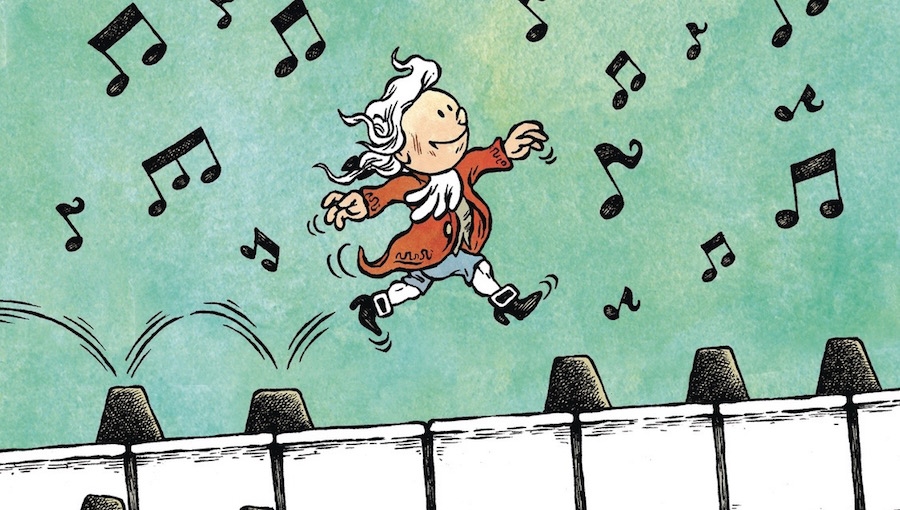Wolfgang Amadeus Mozart famously began composing music when he was only five years old. What was life like for him, being a musical genius at such a young age? What was it like for his family, having to put up with a five-year-old musical genius? That’s the premise of Young Mozart, a series of newspaper-style comic strips based on the composer’s early years.
Originally published in French, the comic takes clear inspiration from Calvin and Hobbes in structure, content, and artistic style. It’s not as brilliant or as funny as Calvin and Hobbes, but that is a pretty high bar to set. The comic still manages to be fairly fun and entertaining in its own right.
Wolfgang, called Wolferl by his family, is certainly a very Calvin-esque figure: clearly smarter than those around him give him credit for, with a sarcastic streak and little interest in following the rules. As a result, he can be a bit of a terror.
More specifically, Wolferl is obsessed with his music in ways only a sarcastic six-year-old can be. He begs his mother for five more minutes on the harpsicord the way today’s kids beg for five more minutes playing their favorite video game. He sneaks off to play when he’s supposed to be doing other things.
And when he’s not playing, he’s composing. His parents and his long-suffering sister Nannerl (Maria Anna Mozart) frequently find musical staffs sketched across walls, fences, clean laundry, household pets, and more. Wolferl also has an obsession with finding music in nature, from organizing frog croaks and birdsongs into a symphony, to drawing staffs on the ground and letting whatever crawls across or lands on them (ants, bird droppings, etc.) serve as the notes.
At least some of the adventures in this comic come directly from the real exploits of young Mozart and his family. Reading it, it’s difficult to know exactly where the facts end and fiction begins. Much of the comic has a ring of truth to it, though it’s obvious that plenty of creative license has been taken, as well. There are also a few inside jokes for those who do know a bit about Mozart’s life or have at least seen Amadeus. In any event, the book manages to be fairly entertaining. It’s not laugh-out-loud funny, but it’s fairly clever, and there are at least a few good chuckles to be had.
The book also serves as an educational tool. At the end is a series of activities designed to teach kids some of the highlights from Mozart’s life and career, as well as the basics of music. There are word searches, matching games, trivia tidbits, and more. Considering how much of my own knowledge as a kid came from silly bits of comedy, and how many of those silly bits I still remember years later, I can definitely see this comic becoming an effective teaching tool. All in all, this is a fun book that both kids and adults will likely enjoy.
Creative Team: Augel (story, art, and conductor), Blase A. Provitola (translator), Fabrice Sapolsky and Alex Donoghue (U.S. edition editors), Amanda Lucido (assistant editor), Vincent Henry (original edition editor), Jerry Frissen (senior art director), and Fabrice Giger (publisher)
Publisher: Humanoids
Click here to purchase.

